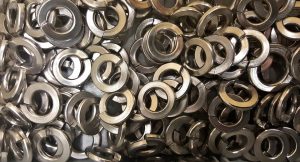
Consisting of a disc-shaped piece of metal — typically carbon steel or stainless steel — washers are used to distribute the load of a bolt. Before placing a bolt through an object, it’s first placed through a washer. The washer works to evenly distribute the load of the bolt to discourage loosening. If a washer breaks or otherwise fails, the bolt may gradually loosen over time. To protect washers from corrosion-related failure, manufacturing companies often treat their washers during production. Here are five common corrosion protection treatments for washers.
#1) Coating
Perhaps the most common corrosion protection treatment for washers is coating. Depending on the material from which a washer is made, it may rust or corrode when exposed to moisture. High-carbon steel, for example, is prone to rust and corrosion. A coating, however, can be applied over a washer to prevent this from happening. Zinc coatings are particularly effective because of their natural ability to resist rust and corrosion.
#2) Chemical Plating
Chemical plating is a corrosion protection process that involves the use of special chemicals to create a rust- and corrosion-resistant surface over a metal object, such as a washer. According to Wikipedia, nickel-phosphor alloy is typically used in chemical plating for washers. The nickel-phosphor alloy is sprayed onto the surface of a washer, thereby triggering a chemical reaction that protects the washer from rust and corrosion.
#3) Browning
Also known as bluing, browning involves the use of a salt or saline solution to create a corrosion-resistant surface of an object. During this treatment process, washers are submerged in a salt or saline solution. This triggers oxidation, which in turn forms a corrosion-resistance surface over the washers. Browning is unique from the other corrosion resistant treatments listed here because of its ability to change the color of the washer. After being browned, washers have a shiny and colorful appearance.
#4) Phosphating
Another common corrosion protection treatment for washers is phosphating. With phosphating, a solution of zinc phosphate and oil is applied to the surface of a washer. The presence of this new layer creates a barrier between the washer itself and its surrounding environment, thereby protecting it from rust and corrosion.
#5) Electroplating
Finally, electroplating refers to the application of the chromium or silver onto an object using an electrical current. When an electric current is applied to these metals, it reduces them into the cations, which then spread evenly to form of a coating over the washer.
